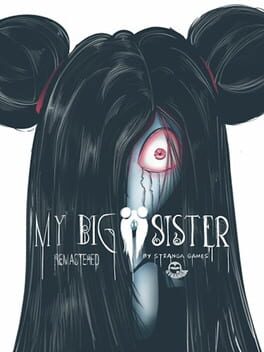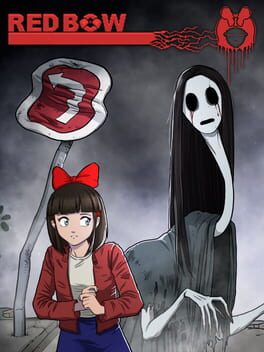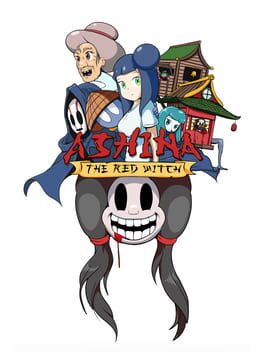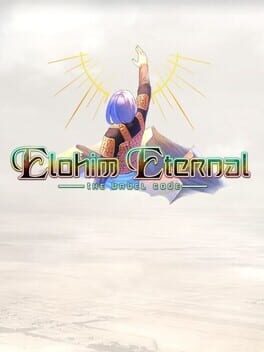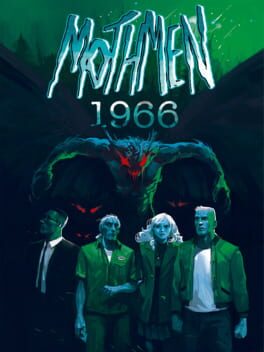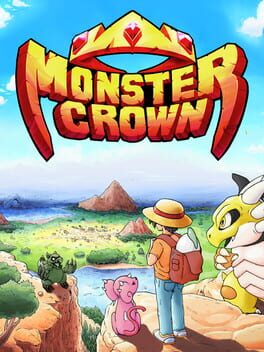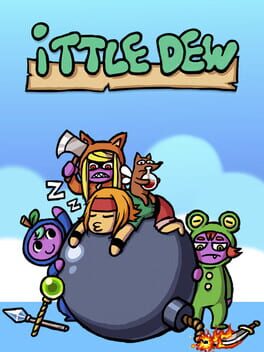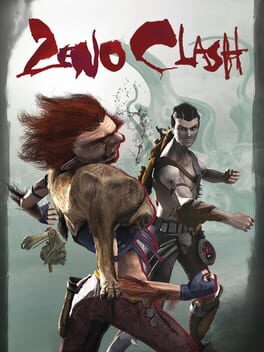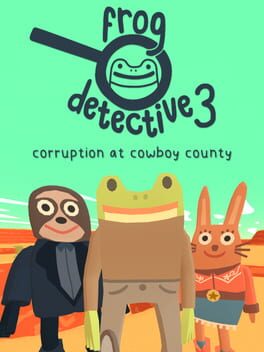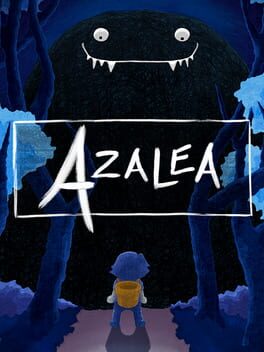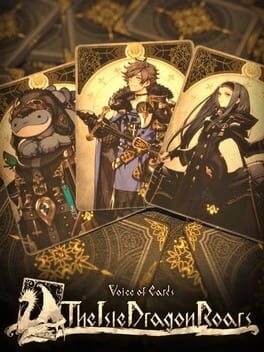jademonkey
I played the remastered version of the game, which I believe makes some small story changes along with the aesthetic overhaul.
I'm not down for writing a full review right now, so I'll just say this: Excellent atmosphere and characters, strong (if slightly confusing) story, and non-frustrating adventure game elements. I'll be playing Stranga's other games in the near future.
I'm not down for writing a full review right now, so I'll just say this: Excellent atmosphere and characters, strong (if slightly confusing) story, and non-frustrating adventure game elements. I'll be playing Stranga's other games in the near future.
2020
Red Bow is a bite-sized adventure horror game by Stranga. I really enjoyed Stranga's My Big Sister (Remastered), but Red Bow didn't really manage to land on an emotional level or offer much that was particular creepy. There were some glaring typos in the script that didn't impede the ability to understand, but pulled me out of the moment a bit. Still, I liked the general concept, the pixel art, the music, and the overall atmosphere. I enjoyed my time with it, and I find it easy to forgive an experience that only took me 80 minutes for not being as impactful as I would have liked.
Another great pixel art horror-adventure by Stranga. Much like Red Bow, it's very light on anything that is actually frightening, opting for an eerie, aesthetic that calls to mind a slightly bloodier Spirited Away.
As with Stranga's other games, there's endearing characters and excellent environments at every turn. The plot stands on its own somewhat well, but becomes much better in the full context of Stranga's previous games Red Bow and My Big Sister (the remastered edition, in particular). Everything up to the ending is great without full context, but I imagine the ending would feel a bit dissonant without the context of the other games. As such, I'd highly recommend playing them first.
I found most of the adventure game style puzzles to be straightforward and not frustrating, serving their job to keep me engaged with the environments well. Only the final puzzle threw me for a bit of a frustrating loop. Unfortunately, for my tastes, the overall narrative puzzle required to unlock the full ending was even more frustrating. Unlike Stranga's previous games, the conditions required to unlock the full ending were sprinkled throughout the game's 4 hour run time and easy to miss. The ending was a bit of letdown without earning all of the scenes, so I didn't want to just leave things there. I opted to just watch the portions of the ending I missed on youtube rather than replay the game in its entirety, which allowed me to a experience a much more satisfying ending, but also left things off on a bit of a sour note.
Still, despite the frustrations at the end, Ashina was a great time. I can't wait to see what Stranga puts out next!
As with Stranga's other games, there's endearing characters and excellent environments at every turn. The plot stands on its own somewhat well, but becomes much better in the full context of Stranga's previous games Red Bow and My Big Sister (the remastered edition, in particular). Everything up to the ending is great without full context, but I imagine the ending would feel a bit dissonant without the context of the other games. As such, I'd highly recommend playing them first.
I found most of the adventure game style puzzles to be straightforward and not frustrating, serving their job to keep me engaged with the environments well. Only the final puzzle threw me for a bit of a frustrating loop. Unfortunately, for my tastes, the overall narrative puzzle required to unlock the full ending was even more frustrating. Unlike Stranga's previous games, the conditions required to unlock the full ending were sprinkled throughout the game's 4 hour run time and easy to miss. The ending was a bit of letdown without earning all of the scenes, so I didn't want to just leave things there. I opted to just watch the portions of the ending I missed on youtube rather than replay the game in its entirety, which allowed me to a experience a much more satisfying ending, but also left things off on a bit of a sour note.
Still, despite the frustrations at the end, Ashina was a great time. I can't wait to see what Stranga puts out next!
2019
My brother gave me Stone Story RPG as a Christmas gift. Once again, he found a game on my wishlist that I'd entirely forgotten about. Once again, it's a genre that I wasn't currently really thinking about playing -- this time an idler. And, once again, I've been having a lot of fun with it.
The presentation in Stone Story RPG is very unique and awesome. I've never seen such fluid, entirely ASCII animation before. I especially love the whip wielding enemies in the mines. So cool. The soundtrack is great and has a good balance of being ambient and mysterious with being catchy at times. The story is fairly minimal, but works very well with the visual and audio presentation to evoke an air of mystery I wasn't expecting from the genre.
The game is very well paced such that each new feature you get feels like it's opening up the possibilities you need at that time. You get weapon crafting off the bat, but slowly add on potions, enchanting, etc. This culminates in an entire scripting language, allowing for an insane degree of automation. I had a great time sitting down and figuring out how to use the limited logic available to automate some of the stages with more complex interactions.
Overall, between the presentation and straight up having scripting available, I've had a great time with Stone Story RPG. I finished the main story and got the credits, but there's a ton of post game content that I can see myself continuing to chip away at.
The presentation in Stone Story RPG is very unique and awesome. I've never seen such fluid, entirely ASCII animation before. I especially love the whip wielding enemies in the mines. So cool. The soundtrack is great and has a good balance of being ambient and mysterious with being catchy at times. The story is fairly minimal, but works very well with the visual and audio presentation to evoke an air of mystery I wasn't expecting from the genre.
The game is very well paced such that each new feature you get feels like it's opening up the possibilities you need at that time. You get weapon crafting off the bat, but slowly add on potions, enchanting, etc. This culminates in an entire scripting language, allowing for an insane degree of automation. I had a great time sitting down and figuring out how to use the limited logic available to automate some of the stages with more complex interactions.
Overall, between the presentation and straight up having scripting available, I've had a great time with Stone Story RPG. I finished the main story and got the credits, but there's a ton of post game content that I can see myself continuing to chip away at.
Games like Elohim Eternal make me glad that RPGmaker exists, allowing more creators to put their stories into the world in video game form.
Elohim Eternal takes a large amount of inspiration from Xenogears and Abrahamic tradition, with a sprinkling of other Egyptian-Mesopotamian mythology. The Xenogears influence is strong enough that I think of the game in many ways as Xenogears-lite, but not disparagingly so. Outside of the obvious facts that Elohim is largely a solo project and clocks in under 15 hours, it also feels much more modern and streamlined than Xenogears, allowing for a smoother play experience. For example, there are no random battles and enemies only respawn if you choose for them to do so. Furthermore, the heavy use of Abrahamic symbolism and historical elements give the game's world a very different feel from any JRPG I've played before.
The writing and characters are solid and kept me engaged and curious throughout the game. That said, I felt at some points that the themes were explored a bit too bluntly -- it could feel like the character was directly telling the player what they should take from events, rather than showing. Luckily, the game never felt preachy, just a bit clumsy in a few instances.
As mentioned, the game is full of modern conveniences, from non-respawing enemies, to auto-optimizing equipment (if desired), to easy access to fully healing between battles. Combat consists of determining an enemies elemental weakness, hitting them with the correct spell which then allows for timed button press for bonus damage, and using "divine mageia" as they charge up. The "divine mageia" allow for most of the interesting strategy having a wide array of buffs, debuffs, damage, and utility, all of which have some sort of cost (e.g. health points) outside of the divine cost to cast them. It's not my favorite JRPG battle system, but it's well done and holds up for the games somewhat short runtime.
Elohim Eternal is only the first game of a planned series. As with any solid first entry, the storya was self-contained enough to be satisfying, but left many questions about the broader mysteries of the world. I'm certainly interested in seeing where those mysteries go.
Elohim Eternal takes a large amount of inspiration from Xenogears and Abrahamic tradition, with a sprinkling of other Egyptian-Mesopotamian mythology. The Xenogears influence is strong enough that I think of the game in many ways as Xenogears-lite, but not disparagingly so. Outside of the obvious facts that Elohim is largely a solo project and clocks in under 15 hours, it also feels much more modern and streamlined than Xenogears, allowing for a smoother play experience. For example, there are no random battles and enemies only respawn if you choose for them to do so. Furthermore, the heavy use of Abrahamic symbolism and historical elements give the game's world a very different feel from any JRPG I've played before.
The writing and characters are solid and kept me engaged and curious throughout the game. That said, I felt at some points that the themes were explored a bit too bluntly -- it could feel like the character was directly telling the player what they should take from events, rather than showing. Luckily, the game never felt preachy, just a bit clumsy in a few instances.
As mentioned, the game is full of modern conveniences, from non-respawing enemies, to auto-optimizing equipment (if desired), to easy access to fully healing between battles. Combat consists of determining an enemies elemental weakness, hitting them with the correct spell which then allows for timed button press for bonus damage, and using "divine mageia" as they charge up. The "divine mageia" allow for most of the interesting strategy having a wide array of buffs, debuffs, damage, and utility, all of which have some sort of cost (e.g. health points) outside of the divine cost to cast them. It's not my favorite JRPG battle system, but it's well done and holds up for the games somewhat short runtime.
Elohim Eternal is only the first game of a planned series. As with any solid first entry, the storya was self-contained enough to be satisfying, but left many questions about the broader mysteries of the world. I'm certainly interested in seeing where those mysteries go.
2022
2020
I'd had my eye on Monster Crown for a while, but thought it looked... rough, so I kept holding off. I grabbed it in the current Humble Bundle and woof. It's as bad as I feared.
It's buggy. The presentation is bad. The combat somehow manages to be a notably worse version of Pokemon. The writing isn't good. The monster designs are more miss than hit for my taste.
I'm big on small indie games and can put up with a lot of jank if I can find a half decent reason to do so, but the only appealing thing here is the breeding system. Unfortunately, breeding monsters becomes much less exciting when you don't like the designs or combat. It's too bad, I really wanted to enjoy this one.
It's buggy. The presentation is bad. The combat somehow manages to be a notably worse version of Pokemon. The writing isn't good. The monster designs are more miss than hit for my taste.
I'm big on small indie games and can put up with a lot of jank if I can find a half decent reason to do so, but the only appealing thing here is the breeding system. Unfortunately, breeding monsters becomes much less exciting when you don't like the designs or combat. It's too bad, I really wanted to enjoy this one.
2013
Fun little puzzle heavy Zelda-like. Most of the puzzles were sokoban style box pushing, but with some extra twists. The combat felt very clumsy, but the game never asked too much of the player and was very forgiving with healing and restarts after death, so it wasn't too frustrating. There's a lot of smirk-worthy humor throughout the game, but nothing really laugh out loud funny.
I wasn't too interested in continuing on to do the optional content, but I enjoyed the three and a half hours I spent on the main quest.
I wasn't too interested in continuing on to do the optional content, but I enjoyed the three and a half hours I spent on the main quest.
2009
Well, that was a unique experience. The melee combat is fairly entertaining and the gun combat is serviceable. The narrative is interesting enough to keep attention, but not spectacular.
The atmosphere is amazing, though. Insane character designs and motivations, bizarre dialogue and music, strange landscapes. I absolutely love the acid trip this game provides.
Zeno Clash took about 3.5 hours playing on normal difficulty -- a bit short, but appropriate for what the game offers. I could easily see it growing stale as a 10-15 hour game, but, luckily, it was paced out well.
The atmosphere is amazing, though. Insane character designs and motivations, bizarre dialogue and music, strange landscapes. I absolutely love the acid trip this game provides.
Zeno Clash took about 3.5 hours playing on normal difficulty -- a bit short, but appropriate for what the game offers. I could easily see it growing stale as a 10-15 hour game, but, luckily, it was paced out well.
What a charming little trilogy.
All three games together have a runtime of about 3 hours, and the gameplay is very simple -- you collect items from the environment and trade them with other characters to get what you need to solve the mysteries. I'd say it lands a bit closer to walking simulator than what you'd expect from point and click games.
The fun comes from the goofy, sometimes absurd, and frequently awkward writing. I was grinning throughout the series, and even laughed out loud on multiple occasions. Top that off with enjoyable music and cute artistic direction, and you've got a great package. There's nothing mind blowing here, but the ending managed to be surprisingly impactful for such a short, silly series. Definitely worth the time!
All three games together have a runtime of about 3 hours, and the gameplay is very simple -- you collect items from the environment and trade them with other characters to get what you need to solve the mysteries. I'd say it lands a bit closer to walking simulator than what you'd expect from point and click games.
The fun comes from the goofy, sometimes absurd, and frequently awkward writing. I was grinning throughout the series, and even laughed out loud on multiple occasions. Top that off with enjoyable music and cute artistic direction, and you've got a great package. There's nothing mind blowing here, but the ending managed to be surprisingly impactful for such a short, silly series. Definitely worth the time!
2020
I'm a big fan of Yoko Taro-isms, so Voice of Cards: The Isle Dragon Roars hit the spot for me. Very fun writing and characters, and the overall plot is decent as well, though not on the level of the Nier series. Keichi Okabe's music is great as always. I really enjoyed presentation style with the audiobook-like narration and card-based visual setup.
The problem is that the combat is about as basic and boring as JRPGs get. Worse, there are random battles that occur with a mind-numbing frequency. As a result, it felt like a bit of a slog, despite the short runtime. Luckily, at some point between launch and my playthrough they added a turbo mode. Funnily enough, it seems to increase the overall game speed, so while my real-world finish time was 10 hours, my in-game time was 14 hours. I'm definitely glad to have saved those 4 hours, and I can imagine my score may have been a bit lower otherwise.
Regardless, I'm looking forward to the sequels. It sounds like they didn't do anything to improve the combat, though, so I'll play a few other games first.
The problem is that the combat is about as basic and boring as JRPGs get. Worse, there are random battles that occur with a mind-numbing frequency. As a result, it felt like a bit of a slog, despite the short runtime. Luckily, at some point between launch and my playthrough they added a turbo mode. Funnily enough, it seems to increase the overall game speed, so while my real-world finish time was 10 hours, my in-game time was 14 hours. I'm definitely glad to have saved those 4 hours, and I can imagine my score may have been a bit lower otherwise.
Regardless, I'm looking forward to the sequels. It sounds like they didn't do anything to improve the combat, though, so I'll play a few other games first.
